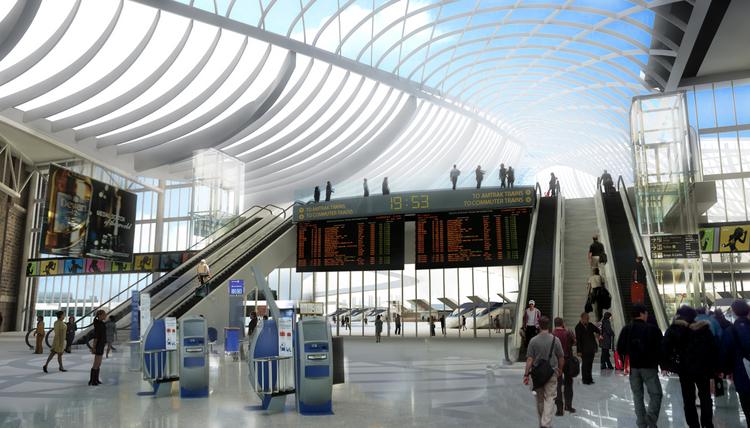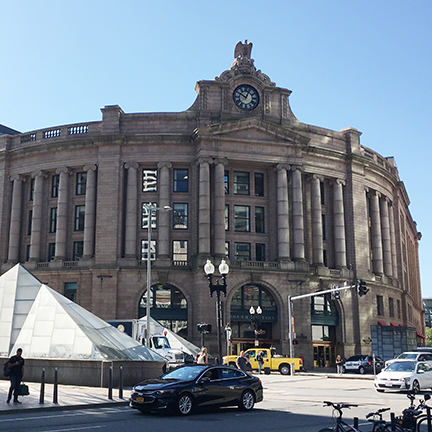A Hub of Transportation and Commerce: Exploring Boston’s South Station
Related Articles: A Hub of Transportation and Commerce: Exploring Boston’s South Station
Introduction
With great pleasure, we will explore the intriguing topic related to A Hub of Transportation and Commerce: Exploring Boston’s South Station. Let’s weave interesting information and offer fresh perspectives to the readers.
Table of Content
A Hub of Transportation and Commerce: Exploring Boston’s South Station

South Station, situated in the heart of Boston, is more than just a transportation hub; it is a vital artery connecting the city to its surrounding areas and beyond. This bustling transportation center serves as a gateway to various modes of travel, including commuter rail, Amtrak, subway lines, and bus services, making it a critical node within Boston’s intricate transportation network.
Navigating the Complex: A Visual Guide to South Station
The station’s expansive layout can initially seem daunting, but a clear understanding of its structure simplifies navigation. The station’s main concourse, known as the "Great Hall," serves as the central hub for passengers. From here, various pathways lead to different levels and platforms.
- Lower Level: This level houses the MBTA’s Red Line and Silver Line, providing access to the city’s extensive subway system. Additionally, this level connects to the Boston Convention and Exhibition Center via a pedestrian tunnel, offering a convenient route for attendees and visitors.
- Main Concourse (Ground Level): This level is the primary entry point for passengers, boasting a vast array of amenities, including ticket counters, information kiosks, retail shops, and food vendors. The main concourse also houses the central bus terminal, offering connections to regional and intercity bus services.
- Upper Level: This level houses the Amtrak station, providing high-speed rail services to destinations across the United States. It also houses the commuter rail platforms, connecting Boston to various suburban communities.
Beyond Transportation: A Gateway to Boston’s Vibrant Cityscape
South Station is not merely a functional transit center; it also serves as a gateway to Boston’s vibrant urban landscape. The station’s proximity to the Financial District, Theatre District, and Chinatown makes it a central point for both business and leisure activities.
- Financial District: Within walking distance of the station, the Financial District is a bustling hub of commerce and finance, attracting professionals and investors from across the globe.
- Theatre District: Just a short walk from South Station, the Theatre District is home to a vibrant arts scene, featuring Broadway shows, live music venues, and independent theaters.
- Chinatown: This vibrant neighborhood, located a short distance from the station, offers a rich cultural experience with authentic cuisine, bustling markets, and traditional shops.
The Importance of South Station: A Vital Component of Boston’s Infrastructure
South Station plays a crucial role in Boston’s economic and social fabric. Its efficient operation ensures the seamless flow of commuters, tourists, and goods, contributing significantly to the city’s economic growth and development.
- Economic Engine: The station’s accessibility and connectivity facilitate the movement of workers, visitors, and goods, contributing to the city’s economic activity and job creation.
- Tourism Hub: South Station serves as a major entry point for tourists, providing convenient access to various attractions and destinations within the city.
- Community Hub: The station’s location within a densely populated area makes it a vital social hub, providing access to essential services, retail outlets, and entertainment options.
FAQs: Navigating the South Station Experience
Q: How do I access the different transportation options at South Station?
A: The station provides clear signage and information kiosks to guide passengers to their desired transportation mode.
Q: Are there any amenities available at South Station?
A: South Station offers a wide range of amenities, including restrooms, ATMs, Wi-Fi, retail shops, and food vendors.
Q: Is South Station accessible for individuals with disabilities?
A: Yes, South Station is equipped with elevators, ramps, and accessible restrooms to ensure accessibility for individuals with disabilities.
Q: Are there any security measures in place at South Station?
A: South Station employs a comprehensive security system, including security personnel, bag checks, and surveillance cameras.
Tips for a Smooth South Station Experience
- Plan your journey in advance: Check schedules and route information before arriving at the station.
- Allow ample time for travel: Factor in potential delays and allow extra time for navigating the station.
- Utilize the station’s amenities: Take advantage of the available amenities, such as restrooms, ATMs, and Wi-Fi.
- Stay aware of your surroundings: Be mindful of your surroundings and report any suspicious activity to station personnel.
Conclusion: South Station – A Vital Intersection in Boston’s Fabric
South Station stands as a testament to Boston’s dynamism and connectivity. Its multifaceted role as a transportation hub, gateway to the city’s vibrant cityscape, and economic engine makes it a vital component of Boston’s infrastructure. As the city continues to evolve, South Station will continue to play a crucial role in shaping its future, fostering economic growth, and connecting communities.


/cdn.vox-cdn.com/uploads/chorus_image/image/56768601/shutterstock_1082977826.12.jpg)





Closure
Thus, we hope this article has provided valuable insights into A Hub of Transportation and Commerce: Exploring Boston’s South Station. We appreciate your attention to our article. See you in our next article!